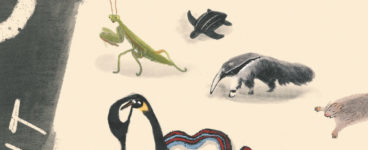‘‘When we merfolk realised we could live forever, we wondered what we should do with our time. We chose to live our lives caring for the creatures of the shore and the sea.’’
Secrets of the Last Merfolk is set in Dunlyre, based on the real-life seaside village of Dunure on Scotland’s stunning west coast. Many of the novel’s action scenes take place in the chilly waters of the Firth of Clyde. Here, author Lindsay Littleson writes of how important this landscape is to her.
Secrets of the Last Merfolk
By Lindsay Littleson
Published by Floris Books
At the beginning of Secrets of the Last Merfolk, Finn is furious when he finds out his dad is in Dunlyre to work on a harbour development project, rather than on the holiday he’d been promised. He meets Sage, whose mums are environmental activists, determined to stop the harbour development. Their parents might be on opposing sides, but when Finn sees swimmers in the freezing sea and Sage hears strange singing, the two children begin to work together to investigate the mystery, and they discover merfolk in the Firth!
Despite being in constant danger from a terrifying enemy, the merfolk take their responsibilities very seriously.
‘When we merfolk realised we could live forever, we wondered what we should do with our time. We chose to live our lives caring for the creatures of the shore and the sea.’
However, they despair of the harm humans are doing to the marine environment.
‘They take too many fish from the seas and the dolphins go hungry. They dump rubbish so the seals must swim in dirty water.’
The theme of environmental conservation is of central importance to the story. My brother’s a keen scuba diver and described his dives in the Firth of Clyde. Being as accurate as possible was important to me, even though I was describing fantasy scenes.
The deeper they went, the dimmer and greener the light gleamed, and the stranger the environment became. As Finn swam through a strange, swaying forest of seaweed, he passed spiky pink sea urchins and scuttling hermit crabs. Spotlit in the torch beam, he saw the pale, drifting tentacles of a cluster of anemones.
Sadly, humans have caused terrible damage to the Firth of Clyde. Once, cod, skate and enormous shoals of herring swam in its waters. But a combination of over-fishing and the lifting of a ban on bottom trawling caused stocks of fish to decline alarmingly, and the fishermen began catching shellfish instead. Dredging methods caused further damage, until by the early 2000s the Firth of Clyde was described as becoming a ‘marine desert’.
Lately, some action has been taken to improve the situation, most notably in the waters around Arran. COAST is a community organisation working for the protection and restoration of the marine environment and their work is making a difference to restoring the biodiversity of the Firth.
We can all play our part, by supporting charities like COAST, by taking part in beach clean-ups and by ensuring that we always take our litter home.
This review of Secrets of the Last Merfolk sums up beautifully what I was trying to achieve when I wrote the novel.
‘Secrets of the Last Merfolk is exciting and action packed, and one of our favourite reads of the year. While it explores and embraces legend, it is also a reminder that we should appreciate our reality – and value the enchanting landscapes, wildlife, and people, that we do have.’
Secrets of the Last Merfolk by Lindsay Littleson is published by Floris Books, priced £7.99.
ALSO IN THIS ISSUE

 The Snow and the Works on the Northern Line
The Snow and the Works on the Northern Line
‘I probably file mannerisms and conversational tics away without even being particularly conscious o …

 The Biggest Footprint
The Biggest Footprint
‘Work up an appetite with a 3km jog around the mega roast chicken. It would just about fit in Centra …













